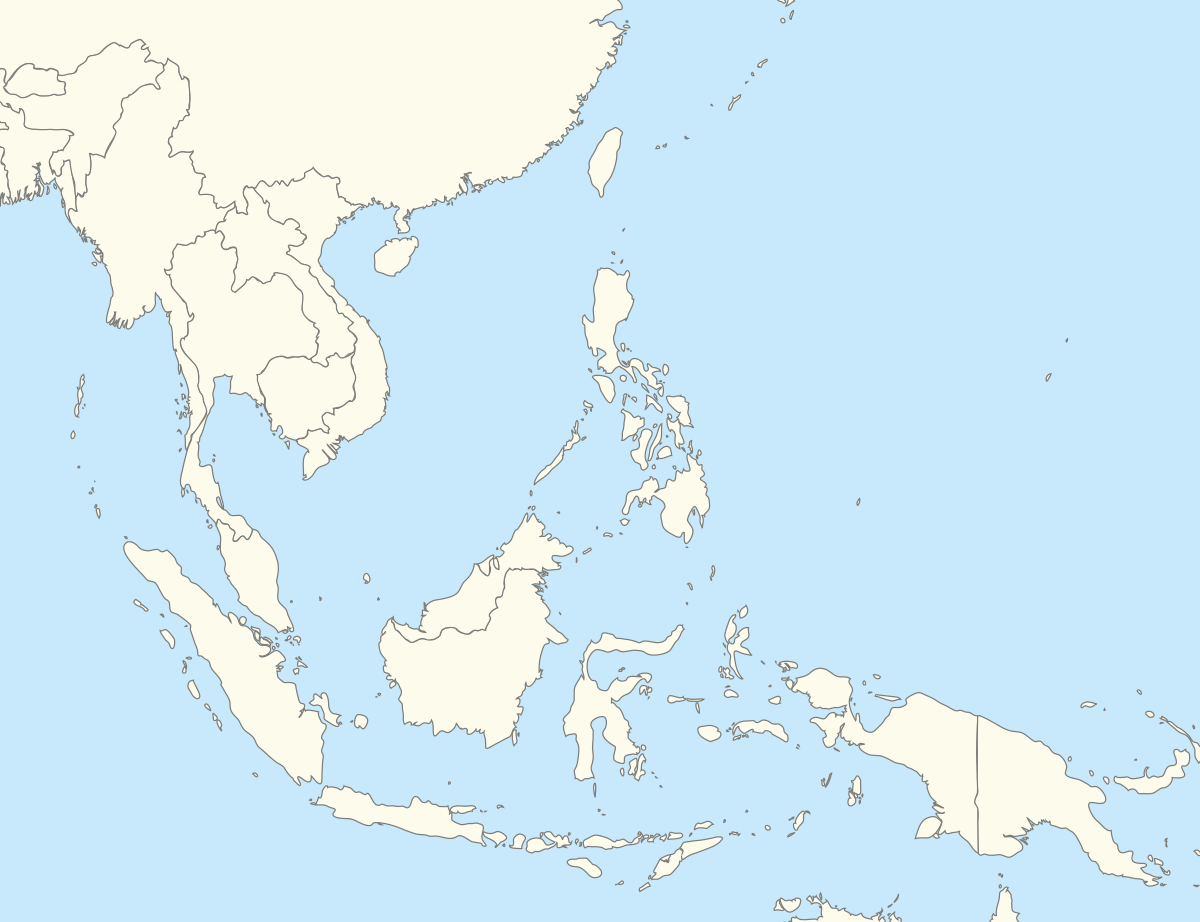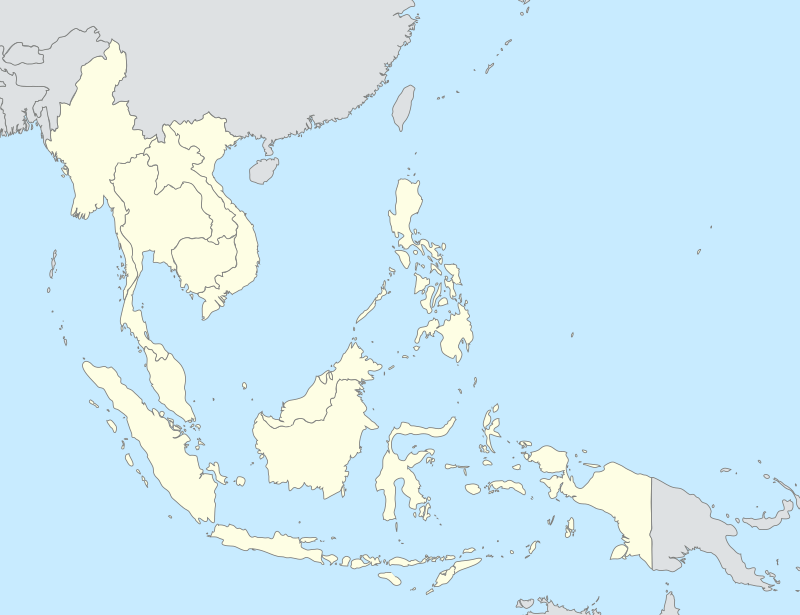Southeast Asian Games
The Southeast Asian Games, also known as the SEA Games (SEAG), is a biennial multi-sport event involving participants from the current 11 countries of Southeast Asia. The games are under the regulation of the Southeast Asian Games Federation with supervision by the International Olympic Committee (IOC) and the Olympic Council of Asia (OCA).
 The Southeast Asian Games Federation logo | |
| Abbreviation | SEA Games |
|---|---|
| First event | 1959 Southeast Asian Peninsular Games in Bangkok, Thailand |
| Occur every | 2 years (every odd year) |
| Next event | 2021 Southeast Asian Games in Hanoi, Vietnam |
| Purpose | Multi sport event for nations on the Southeast Asian subcontinent |
| Headquarters | Bangkok, Thailand |
| President | Charouck Arirachakaran |
| Website | SEAGFOffice.org |
The Southeast Asian Games is one of the five subregional Games of the Olympic Council of Asia (OCA). The others are the Central Asian Games, the East Asian Youth Games, the South Asian Games, and the West Asian Games.[1]
History
The Southeast Asian Games owes its origins to the South East Asian Peninsular Games or SEAP Games. On 22 May 1958, delegates from the countries in Southeast Asian Peninsula attending the Asian Games in Tokyo, Japan had a meeting and agreed to establish a sports organization. The SEAP Games was conceptualized by Luang Sukhum Nayaoradit, then Vice-President of the Thailand Olympic Committee. The proposed rationale was that a regional sports event will help promote co-operation, understanding, and relations among countries in the Southeast Asian region.
Six countries, Burma (now Myanmar), Kampuchea (now Cambodia), Laos, Malaya (now Malaysia), Thailand and the Republic of Vietnam (South Vietnam) were the founding members. These countries agreed to hold the Games biennially in June 1959 and the SEAP Games Federation Committee was formed thereafter.[2]
The first SEAP Games were held in Bangkok from 12–17 December 1959, more than 527 athletes and officials from Burma (now Myanmar), Laos, Malaya (now Malaysia), Singapore, South Vietnam and Thailand participated in 12 sports.
At the 8th SEAP Games in 1975, the SEAP Federation considered the inclusion of Brunei, Indonesia, and the Philippines. These countries were formally admitted in 1977, the same year when SEAP Federation changed their name to the Southeast Asian Games Federation (SEAGF), and the games were known as the Southeast Asian Games. East Timor was admitted at the 22nd Southeast Asian Games in Vietnam.
The 2009 Southeast Asian Games was the first time Laos has ever hosted a Southeast Asian Games (Laos had previously declined to host the 1965 Southeast Asian Peninsular Games citing financial difficulties). Running from 9–18 December, it has also commemorated the 50 years of the Southeast Asian Games, held in Vientiane, Laos.
Logo
The Southeast Asian Games logo was introduced during the 1959 edition in Bangkok, depicting six rings that represent the six founding members and was used until the 1997 edition in Jakarta. The number of rings increased to 10 during the 1999 edition in Brunei to reflect the inclusion of Singapore which was admitted into the Southeast Asian Games Federation in 1961 and Brunei, Indonesia, and the Philippines which joined the organization in 1977. The number of rings was again increased to 11 during the 2011 games in Indonesia to reflect the federation's newest member, East Timor which was admitted in 2003.
Participating NOCs
| NOC Names | Formal Names | Debuted | IOC code | Other codes used |
|---|---|---|---|---|
| Nation of Brunei, the Abode of Peace | 1977 | BRU | BRN (ISO) | |
| Kingdom of Cambodia | 1961 | CAM | KHM (1972–1976, ISO) | |
| Republic of Indonesia | 1977 | INA | IHO (1952), IDN (FIFA, ISO) | |
| Lao People's Democratic Republic | 1959 | LAO | ||
| Federation of Malaysia | 1959 | MAS | MAL (1952 − 1988), MYS (ISO) | |
| Republic of the Union of Myanmar | 1959 | MYA | BIR (1948 – 1988), MMR (ISO) | |
| Republic of the Philippines | 1977 | PHI | PHL (ISO) | |
| Republic of Singapore | 1959 | SGP | SIN (1959 – 2016) | |
| Kingdom of Thailand | 1959 | THA | ||
| Democratic Republic of Timor-Leste | 2003 | TLS | IOA (2000) | |
| Socialist Republic of Vietnam | 1959 | VIE | VET (1964), VNM (1968–1976, ISO) |
Host nations and cities
Since the Southeast Asian Games began in 1959, it has been held in 15 cities across all Southeast Asian countries except Cambodia and East Timor.


| Games | Year | Host country | Host city | Opened by | Office of opener | Date | Sports | Events | Nations | Competitors | Top-ranked team | Ref |
|---|---|---|---|---|---|---|---|---|---|---|---|---|
| Southeast Asian Peninsular Games | ||||||||||||
| 1 | 1959 | Bangkok | Bhumibol Adulyadej | King | 12–17 December | 12 | N/A | 6 | 518 | |||
| 2 | 1961 | Yangon | Win Maung | President | 11–16 December | 13 | N/A | 7 | 623 | |||
| 1963 | Awarded to Cambodia, cancelled due to domestic political situation | |||||||||||
| 3 | 1965 | Kuala Lumpur | Ismail Nasiruddin | Yang di-Pertuan Agong | 14–21 December | 14 | N/A | 6 | 963 | |||
| 4 | 1967 | Bangkok | Bhumibol Adulyadej | King | 9–16 December | 16 | N/A | 6 | 984 | |||
| 5 | 1969 | Yangon | Ne Win | President | 6–13 December | 15 | N/A | 6 | 920 | |||
| 6 | 1971 | Kuala Lumpur | Abdul Halim | Yang di-Pertuan Agong | 6–13 December | 15 | N/A | 7 | 957 | |||
| 7 | 1973 | Singapore | Benjamin Sheares | President | 1–8 September | 16 | N/A | 7 | 1632 | |||
| 8 | 1975 | Bangkok | Bhumibol Adulyadej | King | 9–16 December | 18 | N/A | 4 | 1142 | |||
| Southeast Asian Games | ||||||||||||
| 9 | 1977 | Kuala Lumpur | Yahya Petra | Yang di-Pertuan Agong | 19–26 November | 18 | N/A | 7 | N/A | |||
| 10 | 1979 | Jakarta | Suharto | President | 21–30 September | 18 | N/A | 7 | N/A | |||
| 11 | 1981 | Manila | Ferdinand Marcos | President | 6–15 December | 18 | N/A | 7 | ≈1800 | |||
| 12 | 1983 | Singapore | Devan Nair | President | 28 May – 6 June | 18 | N/A | 8 | N/A | |||
| 13 | 1985 | Bangkok | Bhumibol Adulyadej | King | 8–17 December | 18 | N/A | 8 | N/A | |||
| 14 | 1987 | Jakarta | Suharto | President | 9–20 September | 26 | N/A | 8 | N/A | |||
| 15 | 1989 | Kuala Lumpur | Azlan Shah | Yang di-Pertuan Agong | 20–31 August | 24 | N/A | 9 | ≈2800 | |||
| 16 | 1991 | Manila | Corazon Aquino | President | 24 November – 3 December | 28 | N/A | 9 | N/A | |||
| 17 | 1993 | Singapore | Wee Kim Wee | President | 12–20 June | 29 | N/A | 9 | ≈3000 | |||
| 18 | 1995 | Chiang Mai | Vajiralongkorn | Crown Prince | 9–17 December | 28 | N/A | 10 | 3262 | |||
| 19 | 1997 | Jakarta | Suharto | President | 11–19 October | 36 | 490 | 10 | 5179 | |||
| 20 | 1999 | Bandar Seri Begawan | Hassanal Bolkiah | Sultan | 7–15 August | 21 | 233 | 10 | 2365 | |||
| 21 | 2001 | Kuala Lumpur | Salahuddin | Yang di-Pertuan Agong | 8–17 September | 32 | 391 | 10 | 4165 | |||
| 22 | 2003 | Hanoi and Ho Chi Minh City | Phan Văn Khải | Prime Minister | 5–13 December | 32 | 442 | 11 | ≈5000 | |||
| 23 | 2005 | Manila | Gloria Macapagal Arroyo | President | 27 November – 5 December | 40 | 443 | 11 | 5336 | |||
| 24 | 2007 | Nakhon Ratchasima | Vajiralongkorn | Crown Prince | 6–15 December | 43 | 475 | 11 | 5282 | |||
| 25 | 2009 | Vientiane | Choummaly Sayasone | President | 9–18 December | 29 | 372 | 11 | 3100 | |||
| 26 | 2011 | Jakarta and Palembang | Susilo Bambang Yudhoyono | President | 11–22 November | 44 | 545 | 11 | 5965 | |||
| 27 | 2013 | Naypyidaw | Nyan Tun | Vice President | 11–22 December | 37 | 460 | 11 | 4730 | |||
| 28 | 2015 | Singapore | Tony Tan | President | 5–16 June | 36 | 402 | 11 | 4370 | |||
| 29 | 2017 | Kuala Lumpur | Muhammad V | Yang di-Pertuan Agong | 19–30 August | 38 | 404 | 11 | 4709 | |||
| 30 | 2019 | VariousA | Rodrigo Duterte | President | 30 November – 11 December | 56 | 530 | 11 | 5630 | |||
| 31 | 2021 | Hanoi | Future event | 21 November — 2 December | Future event | |||||||
| 32 | 2023 | Phnom Penh | Future event | 5—15 May | Future event | |||||||
| 33 | 2025 | Chonburi | Future event | |||||||||
Note: A The 2019 Southeast Asian Games is the first officially decentralized games. While games were held in various cities, mostly in the Clark, Metro Manila and the Subic Bay areas, there is no designated host city for this edition alternately known as "Philippines 2019".
The 1963 Southeast Asian Peninsular Games were canceled. As the designated host, Cambodia was not able to host the event due to unsettling in-country conditions, along with a disagreement with the International Amateur Athletic Federation. The 3rd SEAP Games then passed to Laos as hosts, but they begged off the 1965 event citing financial difficulties.[3]
Sports
According to the SEAGF Charter and Rules, a host nation must stage a minimum of 22 sports: the two compulsory sports from Category 1 (athletics and aquatics), in addition to a minimum of 14 sports from Category 2 (olympic and asian games mandatory sports), and a maximum of 8 sports from Category 3 (shaded grey in the table below). Each sport shall not offer more than 5% of the total medal tally, except for athletics, aquatics and shooting (the shot was elevated for this category in 2013). For each sport and event to be included, a minimum of four countries must participate in it. Sports competed in the Olympic Games and Asian Games must be given priority.[2][4]
|
|
All-time medal table
Corrected after balancing the data of the Olympic Council of Asia and other archived sites which had kept the previous Southeast Asian Games medal tables. Some information from the aforementioned sites are missing, incorrect and or not updated.[5][6][7][8][9][10][11]
| Rank | NOC | Gold | Silver | Bronze | Total |
|---|---|---|---|---|---|
| 1 | 1885 | 1930 | 1943 | 5758 | |
| 2 | 1824 | 1703 | 1780 | 5307 | |
| 3 | 1303 | 1273 | 1685 | 4261 | |
| 4 | 1067 | 1193 | 1477 | 3737 | |
| 5 | 947 | 1002 | 1363 | 3312 | |
| 6 | 928 | 967 | 991 | 2886 | |
| 7 | 564 | 741 | 992 | 2297 | |
| 8 | 69 | 115 | 258 | 442 | |
| 9 | 69 | 93 | 319 | 481 | |
| 10 | 14 | 55 | 163 | 232 | |
| 11 | 3 | 6 | 26 | 35 | |
| Totals (11 NOCs) | 8673 | 9078 | 10997 | 28748 | |
- ^[1] - 2017 Southeast Asian Games medal counts are not yet included in these medal standings due to ongoing doping cases during those games
- ^[2] – Competed as Malaya in the inaugural games until 1961.
- ^[3] – The Republic of Vietnam was dissolved in July 1976 when it merged with the Democratic Republic of Vietnam (North Vietnam) to become the Socialist Republic of Vietnam, also known as Vietnam. Therefore, the medal counts for this country are considered to be as until 1975. In the 1989 edition, a unified Vietnam rejoined the games with a new name and flag. Medals won by South Vietnam are already combined here. The International Olympic Committee (IOC) does not use codes for South Vietnam anymore after the unification with North Vietnam.
- ^[4] – Competed as Burma until 1987.
- ^[5] – Competed as Kampuchea, and Khmer Republic.
List of multiple Southeast Asian Games medalists
Various individuals have won multiple medals at the Games, including the preceding Southeast Asian Peninsular Games.
As of 2019, Singaporean swimmer Joscelin Yeo has won the most Southeast Asian Games medals with 55 (40 gold, 12 silver, 3 bronze). She reached this milestone during the 2005 Games, overtaking the previous record of 39 gold medals set by another Singaporean swimmer Patricia Chan.
Criticism
The games are unique in that it has no official limits to the number of sports and events to be contested, and the range can be decided by the organizing host pending approval by the Southeast Asian Games Federation. Aside from mandatory sports the host is free to drop or introduce other sports or events.[12]
This leeway has resulted in hosts maximizing their medal hauls by dropping sports disadvantageous to themselves relative to their peers and the introduction of obscure sports, often at short notice, thus preventing most other nations from building credible opponents. Examples of these include:
- At the 2001 Southeast Asian Games, Malaysia introduced pétanque, and netball.
- At the 2003 Southeast Asian Games, Vietnam added fin swimming and shuttlecock, and had the wushu offer 28 golds from 16 in 2001.
- In the 2005 Southeast Asian Games, the Philippines added arnis, a demonstration sport in 2003, with six sets of medals, and it won three golds. Also added were baseball, dancesport, and softball.
- At the 2007 Southeast Asian Games, Thailand added new categories of sepak takraw However,the thai sepak takraw federation decided to exchange the traditional ball made of rattan for a rubber ball, which was not common in other participating countries, causing great controversy and motivating the boycott of Malaysia, its great rival in the sport and by athletes from another countries in anothers. Consequently, the country won all the 8 events,the local organizers also added futsal.[13]
- In the 2011 Southeast Asian Games, Indonesia the organizers decided to cancel the team events in table tennis and also to reduce the number of events in shoting to 14, following the decisions made by the International Sport Federation to reduce the number of events in the World Championships. . At the same time, bridge, kenpō, paragliding, vovinam and wall climbing were introduced.
- In the 2013 Southeast Asian Games, Myanmar introduced its indigenous sport Chinlone. The host won six of eight gold medals in the event.They also introduced board games with events on Sittuyin, a traditional burmanese board game and chess.[14]
- In the 2017 Southeast Asian Games, Malaysia introduced cricket, indoor hockey and three ice sports, namely figure skating, short track speed skating and ice hockey.[15]
- In the 2019 Southeast Asian Games, the Philippines added beach handball, duathlon, e-sports, jiu-jitsu, kickboxing, kurash, sambo, skateboarding, surfing and wakeboarding and some events in Modern Pentathlon were made in non-Olympic formats.
See also
|
|
|
|
References
- Games page of the website of the Olympic Council of Asia; retrieved 2010-07-09.
- "South East Asian Games Federation: Charter and Rules" (PDF). SEAGF. 30 May 2010. Retrieved 30 December 2015.
- "History of the SEA Games". www.olympic.org.my. Archived from the original on 17 December 2004. Retrieved 26 February 2013.
- Ian De Cotta (5 June 2015). "A cool addition to the SEA Games". Today Online. Retrieved 5 June 2015.
- "South East Asian Games Medal Count". Retrieved 31 August 2017.
- SEAP Games Federation
- Medal Tally 1959-1995
- Medal Tally
- History of the SEA Games
- SEA Games previous medal table
- SEA Games members
- Pattharapong Rattanasevee (21 July 2017). "Southeast Asian Games yet to win gold for sporting spirit". South China Morning Post.
- Sports. "VietNamNet - SEA Games or a village festival | SEA Games or a village festival". English.vietnamnet.vn. Retrieved 2 June 2011.
- HS Manjunath (10 December 2013). "Cambodia eye record medal haul". The Phnom Penh Post. Retrieved 13 December 2013.
- "4 new sports we can now watch in 2017 SEA Games". Red Bull. Retrieved 29 August 2017.
External links
- Olympic Council of Asia Regional Hosting List
- SEA Games Federation
- Medal Tally 1959-1995
- Medal Tally
- History of the SEA Games
- SEA Games previous medal table
- SEA Games members